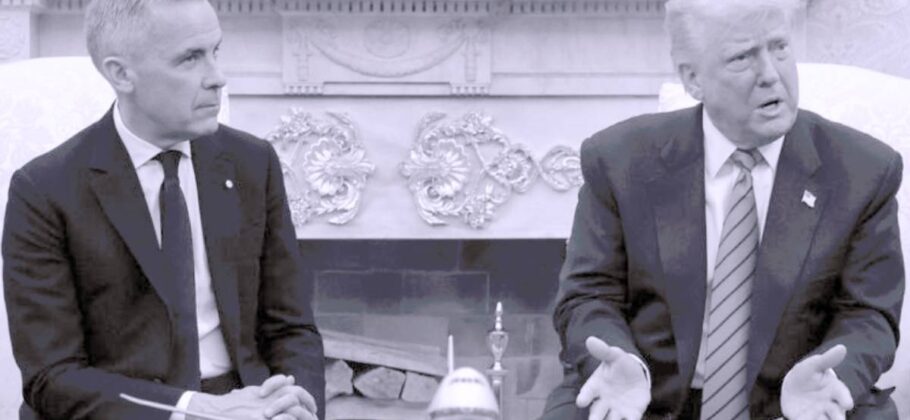President Donald Trump has abruptly ended trade negotiations with Canada, throwing the future of one of the world’s largest trading relationships into uncertainty. His decision, announced Friday, was triggered by Canada’s new digital services tax on U.S. technology companies. The move has sparked concern among business leaders and officials on both sides of the border who fear a damaging economic confrontation.
A Massive Economic Relationship at Risk
The United States and Canada are deeply tied through trade. According to the U.S. Department of Commerce, Canada bought $349 billion worth of American goods last year, more than any other country. At the same time, Canada shipped $413 billion in goods to the U.S., making it America’s third-largest supplier of imports. Canada relies heavily on the U.S. market for over 75 percent of its exports.
Brian Clow, who served as deputy chief of staff to former Prime Minister Justin Trudeau, described how serious these trade flows are for Canada’s economy. “Canada depends on U.S. trade for a fifth of its gross domestic product,” he said. Business leaders warn that escalating tensions could put thousands of jobs in jeopardy.
The Digital Services Tax That Sparked the Clash
The immediate cause of the dispute is Canada’s digital services tax, or DST. Set to take effect on Monday, the DST imposes a 3 percent levy on revenues earned from Canadian users by large online companies, including Google, Amazon, and Meta. What has angered Washington most is the fact that the tax is retroactive to 2022.
Canadian Finance Minister François-Philippe Champagne said the government would not back down. “The Canadian government had no intention of scrapping the tax,” he explained earlier this month. According to estimates, the initial payment could total $3 billion, with subsequent yearly payments over $1 billion.
President Trump expressed outrage over the tax. In a Truth Social post, he wrote, “Based on this egregious Tax, we are hereby terminating ALL discussions on Trade with Canada, effective immediately.” He also threatened new tariffs, adding, “We will let Canada know the Tariff that they will be paying to do business with the United States of America within the next seven day period.”
Treasury Secretary Scott Bessent said the tax represented a “direct and blatant attack on our Country.” He appeared on CNBC to explain further. “We think it’s patently unfair to do it retroactive,” Bessent said. “This is something from the Trudeau years, so we were hoping, as a sign of goodwill, that the new Carney administration would at least put a break on that during the trade talks. They seem not to have.”
A Long History of Tariff Battles
The digital tax is just the latest in a series of trade disputes between the two countries. During Trump’s first term, the U.S.-Mexico-Canada Agreement, known as USMCA, set rules on many sectors, but some issues remained unresolved.
Canada has already faced steep tariffs on steel and aluminum. Trump doubled those tariffs to 50 percent last year. Goods from Canada that are not compliant with USMCA face a 25 percent tariff plus additional penalties. In response, Canada retaliated with a 25 percent tariff on $43 billion worth of American products, including whiskey, household appliances, and sporting goods.
Trump also threatened to impose a 25 percent tariff on all Canadian exports. While most Canadian products have so far avoided that blanket tariff, the risk of new duties has kept industries on edge.
At the G7 summit this month, Trump and Canadian Prime Minister Mark Carney agreed to set a 30-day deadline to resolve disputes over the digital tax and dairy quotas. That effort collapsed when Trump ended talks without warning. “Economically, we have such power over Canada,” Trump told reporters in the Oval Office. “I’d rather not use it, but they did something with our tech companies. It’s not going to work out well for Canada.”
Canadian Response
Prime Minister Carney said he would not abandon efforts to find a solution. “These are very complex negotiations, and we are going to continue them in the best interests of Canadians,” Carney said Friday.
Business leaders in Canada urged the government to reconsider the digital tax to avoid further damage. Goldy Hyder, president and CEO of the Business Council of Canada, warned, “The implementation of a unilateral digital services tax could risk undermining Canada’s economic relationship with its most important trading partner, the United States.”
He added, “That unfortunate development has now come to pass.” In a statement, Hyder called on the Canadian government to act quickly. “Canada should put forward an immediate proposal to eliminate the DST in exchange for an elimination of tariffs from the United States.”
Ontario Premier Doug Ford also voiced concern. “For our American partners, this is nothing but an unfair tax that’s putting millions of Canadian jobs at risk,” Ford said in a speech last October.
Former Canadian Ambassador Frank McKenna described Trump’s action as a sign of unpredictability. “It’s an extraordinary action by a neighbor and trading partner,” McKenna told Fox News Digital. “It just demonstrates how unpredictable and chaotic the United States is under President Trump.”
The tech sector has lobbied Washington aggressively to oppose the DST. Matt Schruers, CEO of the Computer & Communications Industry Association, praised Trump’s move. “We appreciate the administration’s decisive response to Canada’s discrimination against digital commerce,” Schruers said.
Tech companies worry that if Canada succeeds in collecting the tax, other countries will quickly impose their own versions. Treasury Secretary Bessent warned, “We’re in active discussions with them to take those down.”
Meta Chief Global Affairs Officer Joel Kaplan and Karan Bhatia, Google’s global head of government affairs, publicly thanked Trump on social media. They credited him with defending American innovation from what they see as unfair foreign policies.
Trump said he will announce new tariffs within days. Canadian officials are preparing for potential retaliation but have so far signaled they want to keep channels of communication open.
Pierre Poilievre, leader of Canada’s Conservative Party, called for calm. “Disappointed that trade talks have halted,” he wrote online. “Hopefully they resume quickly.”
But with both sides dug in, experts predict more turmoil ahead. As McKenna put it, “This is going to be very difficult. Both countries have a lot to lose, and right now there’s no clear path to resolving it.”











